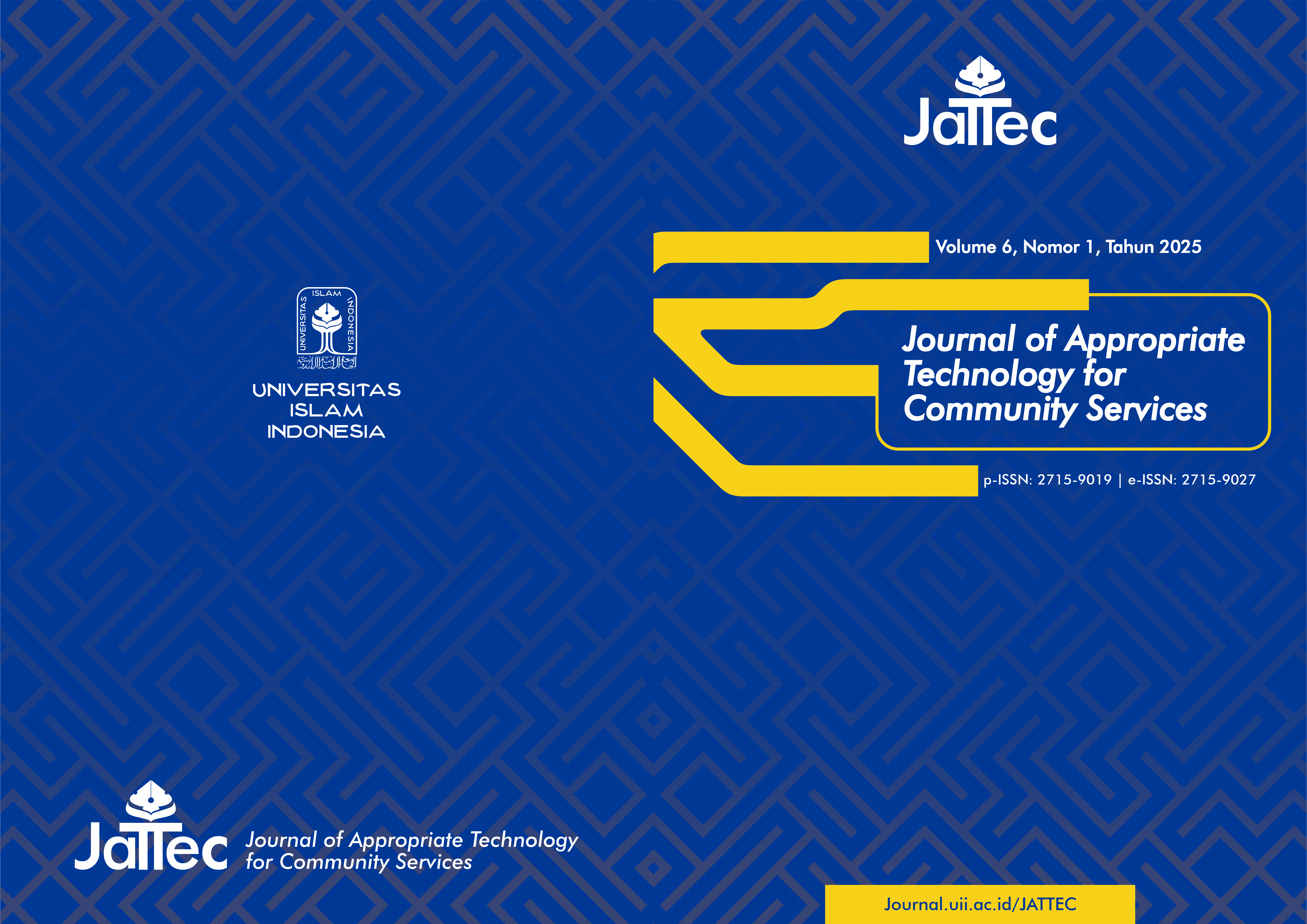Main Article Content
Abstract
One of the urgent issues worldwide is infectious waste, which impacts both the environment and health. Infectious waste includes various types of medical waste, such as disposable diapers and sanitary pads contaminated with hazardous materials like blood, bodily fluids, and other pathogens. If not properly managed, infectious waste can lead to the spread of diseases. The village of Tanjungrejo, located in the Ngombol subdistrict, has a well-managed TPS3R Waste Bank, but one of the issues they face is the lack of a management method for infectious waste like disposable diapers and sanitary pads. In Tanjungrejo, infectious waste is often disposed of by being dumped into streams or burned along with other waste due to the lack of proper facilities for managing infectious waste. This method of waste management can lead to the transmission of diseases and environmental pollution, such as water, air, and soil contamination. Based on these issues, the aim of this community service project is to develop technologies and innovations to help address environmental problems, including the management of infectious waste. The project will use the Design Thinking method, which includes the stages of empathize, define, ideate, prototype, and test.
Keywords
Article Details
References
- Arlinda, V.P., Windraswara, R. and Azinar, M. (2022) ‘Analisis Pengelolaan Limbah Medis’.
- Farkhati, D.U. and Mulasari, S.A. (2022) ‘Tantangan Limbah Infeksius Corona Virus Disease 2019 (Covid-19) yang Berasal dari Rumah Tangga’, JUMANTIK (Jurnal Ilmiah Penelitian Kesehatan), 7(4), p. 329. Available at: https://doi.org/10.30829/jumantik.v7i4.11221.
- Fikri, E. et al. (2023) ‘Penerapan Metode Daur Ulang Sampah B3 Rumah Tangga Infeksius Dengan Pendekatan Life Cycle Assessment Melalui Pemberdayaan Masyarakat’, Jurnal Aisyah : Jurnal Ilmu Kesehatan, 8(3). Available at: https://doi.org/10.30604/jika.v8i3.981.
- Hamar, B. et al. (2023) ‘Sosialisasi Dampak Pencemaran Lingkungan Laut Oleh Limbah Rumah Tangga Di Desa Talaga Baru Kecamatan Lasalimu Kabupaten Buton’, 02(8), pp. 1693–1698.
- Herlambang, A., Sutanto, H. and Wibowo, K. (2016) ‘Produksi Gas Metana Dari Pengolahan Sampah Perkotaan Dengan Sistem Sel’, Jurnal Teknologi Lingkungan, 11(3), p. 389. Available at: https://doi.org/10.29122/jtl.v11i3.1184.
- Jaelani, M.A.K. (2024) ‘Uji Konsumsi Bahan Bakar Mesin Pencacah Plastik’, Nozzle : Journal Mechanical Engineering, 13(1). Available at: https://doi.org/10.30591/nozzle.v13i1.6675.
- Junaidi, J., Kurniawan, E. and Lasmana, A. (2021) ‘Analisis Laju Aliran Udara dan Laju Aliran Massa Bahan Bakar Terhadap Beban Pembakaran Sampah pada Incinerator Berbahan Bakar Limbah Oli Bekas’, Jurnal Engine: Energi, Manufaktur, dan Material, 5(1), p. 17. Available at: https://doi.org/10.30588/jeemm.v5i1.838.
- Kristyawan, I.P.A. (2017) ‘Pengolahan Sampah Dengan Teknologi Hidrotermal’, Jurnal Rekayasa Lingkungan, 10(1). Available at: https://doi.org/10.29122/jrl.v10i1.2120.
- Prianto, R.O.P. and Murti, R.H.A. (2024) ‘Estimasi Timbulan Emisi Gas Metana dari Kegiatan Penimbunan Sampah di TPA Desa Selopuro Kabupaten Ngawi dengan Metode IPCC 2006’.
- Pristya, T.Y.R. and Amalia, R. (2021) ‘Warga TPA Cipayung Pegiat Zero Waste: Produksi Pembalut Kain Selamatkan Diri dan Lingkungan’.
- Septiani, R.A., Nurhayati, A. and Pujiono, P. (2023) ‘Penanganan Limbah Medis Padat Dan Limbah Medis Cair’, Jurnal Riset Kesehatan Poltekkes Depkes Bandung, 15(1), pp. 58–69. Available at: https://doi.org/10.34011/juriskesbdg.v15i1.2215.
References
Arlinda, V.P., Windraswara, R. and Azinar, M. (2022) ‘Analisis Pengelolaan Limbah Medis’.
Farkhati, D.U. and Mulasari, S.A. (2022) ‘Tantangan Limbah Infeksius Corona Virus Disease 2019 (Covid-19) yang Berasal dari Rumah Tangga’, JUMANTIK (Jurnal Ilmiah Penelitian Kesehatan), 7(4), p. 329. Available at: https://doi.org/10.30829/jumantik.v7i4.11221.
Fikri, E. et al. (2023) ‘Penerapan Metode Daur Ulang Sampah B3 Rumah Tangga Infeksius Dengan Pendekatan Life Cycle Assessment Melalui Pemberdayaan Masyarakat’, Jurnal Aisyah : Jurnal Ilmu Kesehatan, 8(3). Available at: https://doi.org/10.30604/jika.v8i3.981.
Hamar, B. et al. (2023) ‘Sosialisasi Dampak Pencemaran Lingkungan Laut Oleh Limbah Rumah Tangga Di Desa Talaga Baru Kecamatan Lasalimu Kabupaten Buton’, 02(8), pp. 1693–1698.
Herlambang, A., Sutanto, H. and Wibowo, K. (2016) ‘Produksi Gas Metana Dari Pengolahan Sampah Perkotaan Dengan Sistem Sel’, Jurnal Teknologi Lingkungan, 11(3), p. 389. Available at: https://doi.org/10.29122/jtl.v11i3.1184.
Jaelani, M.A.K. (2024) ‘Uji Konsumsi Bahan Bakar Mesin Pencacah Plastik’, Nozzle : Journal Mechanical Engineering, 13(1). Available at: https://doi.org/10.30591/nozzle.v13i1.6675.
Junaidi, J., Kurniawan, E. and Lasmana, A. (2021) ‘Analisis Laju Aliran Udara dan Laju Aliran Massa Bahan Bakar Terhadap Beban Pembakaran Sampah pada Incinerator Berbahan Bakar Limbah Oli Bekas’, Jurnal Engine: Energi, Manufaktur, dan Material, 5(1), p. 17. Available at: https://doi.org/10.30588/jeemm.v5i1.838.
Kristyawan, I.P.A. (2017) ‘Pengolahan Sampah Dengan Teknologi Hidrotermal’, Jurnal Rekayasa Lingkungan, 10(1). Available at: https://doi.org/10.29122/jrl.v10i1.2120.
Prianto, R.O.P. and Murti, R.H.A. (2024) ‘Estimasi Timbulan Emisi Gas Metana dari Kegiatan Penimbunan Sampah di TPA Desa Selopuro Kabupaten Ngawi dengan Metode IPCC 2006’.
Pristya, T.Y.R. and Amalia, R. (2021) ‘Warga TPA Cipayung Pegiat Zero Waste: Produksi Pembalut Kain Selamatkan Diri dan Lingkungan’.
Septiani, R.A., Nurhayati, A. and Pujiono, P. (2023) ‘Penanganan Limbah Medis Padat Dan Limbah Medis Cair’, Jurnal Riset Kesehatan Poltekkes Depkes Bandung, 15(1), pp. 58–69. Available at: https://doi.org/10.34011/juriskesbdg.v15i1.2215.

